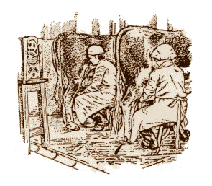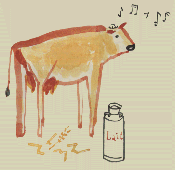 It has been said that more milk is obtained with background
music, which is Mozart, than without music. In fact, there is an old genre
painting in England on which milkwomen are milking cows with a radio in
their neibourhood. They might have done so because it has been known by
experience that the quantity of milk increases by music or human voice.
However, the scientists do not officially admit such relation between the
milk quantity and music. It has been said that more milk is obtained with background
music, which is Mozart, than without music. In fact, there is an old genre
painting in England on which milkwomen are milking cows with a radio in
their neibourhood. They might have done so because it has been known by
experience that the quantity of milk increases by music or human voice.
However, the scientists do not officially admit such relation between the
milk quantity and music.
About this, Dr. Sternheimer says: "From the point of view of the protein
music, there is certain relations between the music of Mozart and the quality
of milk." The characteristic music style of Mozart can be recognized
in the melody of prolactin, a protein which plays an important role in producing
milk in cows and is also called mammotropic hormone.
A musicologist points out: "The melody of prolactin contains several
passages very similar to those of Mozart. One typical example is the final
8 notes in the attached score." A pianist finds out, in the attached
score, a feature seen in the earliest works of Mozart at his Salzburg period.
Prolactin facilitates to produce tasty milk
 So as to verify his theory, Dr. Sternheimer made some experiments with
cows in Charente at the central west of France: what will be the difference
between milk with music and that without music? At milking, the music of
lactogloblin and lactoalbumin in addition to that of prolactin were played
near cows. Then the quantity of whey became one third of that obtained in
the case of no music, and therefore milk with high quality rich in proteins
were obtained. Cheese made from the milk was, according to a testing panel,
very delicious. The cheese made of the milk was also sold in a shop in Paris
and the sales became 6 times more than usual during 2 weeks when the experiment
has been carried out. So as to verify his theory, Dr. Sternheimer made some experiments with
cows in Charente at the central west of France: what will be the difference
between milk with music and that without music? At milking, the music of
lactogloblin and lactoalbumin in addition to that of prolactin were played
near cows. Then the quantity of whey became one third of that obtained in
the case of no music, and therefore milk with high quality rich in proteins
were obtained. Cheese made from the milk was, according to a testing panel,
very delicious. The cheese made of the milk was also sold in a shop in Paris
and the sales became 6 times more than usual during 2 weeks when the experiment
has been carried out.
We have already made "musical bread" and now tasty cheese with
music came to join it. We miss then good musical wine.
Setting aside the topic, we must be very careful when the music of protein
is applied to cows. If prolactin is too stimulated in cows, they tend to
be affected with mammites. It is to be noted that "musical remedy"
should be used appropriately. Readers, therefore, must be cautious not to
play the attached score for amusing although it corresponds to the melody
of the prolactin of cow and not of human beings.
Cows affected with the mad-cow disease may be saved by using the protein
music
As for other diseases of cows, there may be pointed out the mad-cow disease
about which much was talked recently. This disease is officially called
the bovine spongiform encephalopathy (BSE), which makes the brain of cow
a sponge-like material and leads them to death. The first cow affected with
this disease was discovered in 1986 in England. There is also a counterpart
for human being, which is called the Creutzfeldt-Jakob disease. Both diseases,
of cows and of human beings, are said to be caused by a protein called prion
which is neither a virus nor a bacterium.
What is then the protein melody corresponding to the prion? Here again,
let's listen to Dr. Sternheimer: "Since the 1950's, the effect of the
music of Mozart on the milking of cows has been appeared, for example, in
newspapers. Then, many breeders in England began to switch on the radio
during the daytime in their cattle pen although Mozart is not always heard
from the radio...
By the way, among melodies we hear often in these years, there is one -
the so-called "trance" music - which contains a passage common
to that of prion at its repeated portion and which may promote the synthesis
of the prion. It is therefore no wonder if cows in the cattle pens heard
such music with this passage from the radio which were on during the daytime
and they were influenced unfavorably. If the music is uncomfortable for
us, we can turn off the radio or leave the place not to hear the music any
more, and we can avoid the harm which may bring us. However, cows cannot
escape from the music even if they feel it uncomfortable."
Dr. Sternheimer, therefore, proposes that it will be worth while trying,
as a measure for coping with the mad-cow disease by using the music of protein,
to put the music which inhibits the prion on the air so as to be heard by
cows. |
 It has been said that more milk is obtained with background
music, which is Mozart, than without music. In fact, there is an old genre
painting in England on which milkwomen are milking cows with a radio in
their neibourhood. They might have done so because it has been known by
experience that the quantity of milk increases by music or human voice.
However, the scientists do not officially admit such relation between the
milk quantity and music.
It has been said that more milk is obtained with background
music, which is Mozart, than without music. In fact, there is an old genre
painting in England on which milkwomen are milking cows with a radio in
their neibourhood. They might have done so because it has been known by
experience that the quantity of milk increases by music or human voice.
However, the scientists do not officially admit such relation between the
milk quantity and music.
 So as to verify his theory, Dr. Sternheimer made some experiments with
cows in Charente at the central west of France: what will be the difference
between milk with music and that without music? At milking, the music of
lactogloblin and lactoalbumin in addition to that of prolactin were played
near cows. Then the quantity of whey became one third of that obtained in
the case of no music, and therefore milk with high quality rich in proteins
were obtained. Cheese made from the milk was, according to a testing panel,
very delicious. The cheese made of the milk was also sold in a shop in Paris
and the sales became 6 times more than usual during 2 weeks when the experiment
has been carried out.
So as to verify his theory, Dr. Sternheimer made some experiments with
cows in Charente at the central west of France: what will be the difference
between milk with music and that without music? At milking, the music of
lactogloblin and lactoalbumin in addition to that of prolactin were played
near cows. Then the quantity of whey became one third of that obtained in
the case of no music, and therefore milk with high quality rich in proteins
were obtained. Cheese made from the milk was, according to a testing panel,
very delicious. The cheese made of the milk was also sold in a shop in Paris
and the sales became 6 times more than usual during 2 weeks when the experiment
has been carried out.